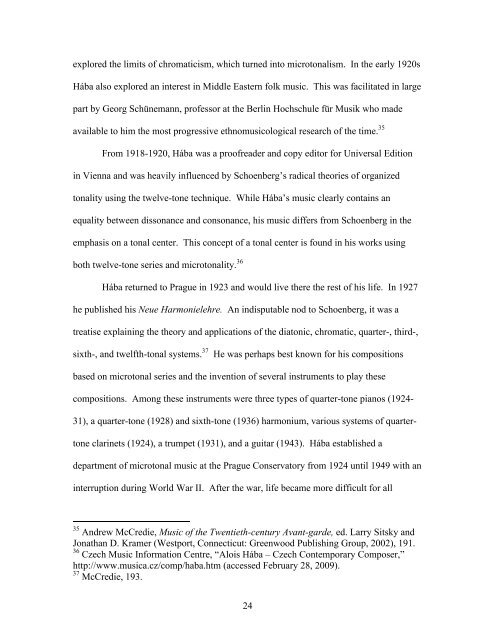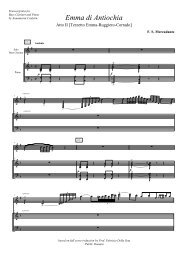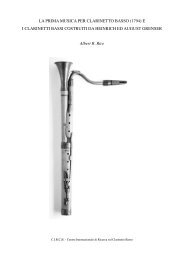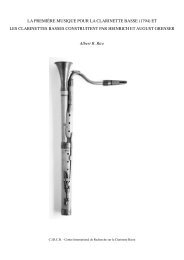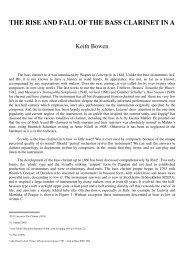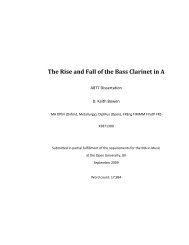Dissertation - International Bass Clarinet Research Center
Dissertation - International Bass Clarinet Research Center
Dissertation - International Bass Clarinet Research Center
Create successful ePaper yourself
Turn your PDF publications into a flip-book with our unique Google optimized e-Paper software.
explored the limits of chromaticism, which turned into microtonalism. In the early 1920s<br />
Hába also explored an interest in Middle Eastern folk music. This was facilitated in large<br />
part by Georg Schünemann, professor at the Berlin Hochschule für Musik who made<br />
available to him the most progressive ethnomusicological research of the time. 35<br />
From 1918-1920, Hába was a proofreader and copy editor for Universal Edition<br />
in Vienna and was heavily influenced by Schoenberg’s radical theories of organized<br />
tonality using the twelve-tone technique. While Hába’s music clearly contains an<br />
equality between dissonance and consonance, his music differs from Schoenberg in the<br />
emphasis on a tonal center. This concept of a tonal center is found in his works using<br />
both twelve-tone series and microtonality. 36<br />
Hába returned to Prague in 1923 and would live there the rest of his life. In 1927<br />
he published his Neue Harmonielehre. An indisputable nod to Schoenberg, it was a<br />
treatise explaining the theory and applications of the diatonic, chromatic, quarter-, third-,<br />
sixth-, and twelfth-tonal systems. 37<br />
He was perhaps best known for his compositions<br />
based on microtonal series and the invention of several instruments to play these<br />
compositions. Among these instruments were three types of quarter-tone pianos (1924-<br />
31), a quarter-tone (1928) and sixth-tone (1936) harmonium, various systems of quartertone<br />
clarinets (1924), a trumpet (1931), and a guitar (1943). Hába established a<br />
department of microtonal music at the Prague Conservatory from 1924 until 1949 with an<br />
interruption during World War II. After the war, life became more difficult for all<br />
35 Andrew McCredie, Music of the Twentieth-century Avant-garde, ed. Larry Sitsky and<br />
Jonathan D. Kramer (Westport, Connecticut: Greenwood Publishing Group, 2002), 191.<br />
36 Czech Music Information Centre, “Alois Hába – Czech Contemporary Composer,”<br />
http://www.musica.cz/comp/haba.htm (accessed February 28, 2009).<br />
37 McCredie, 193.<br />
24


